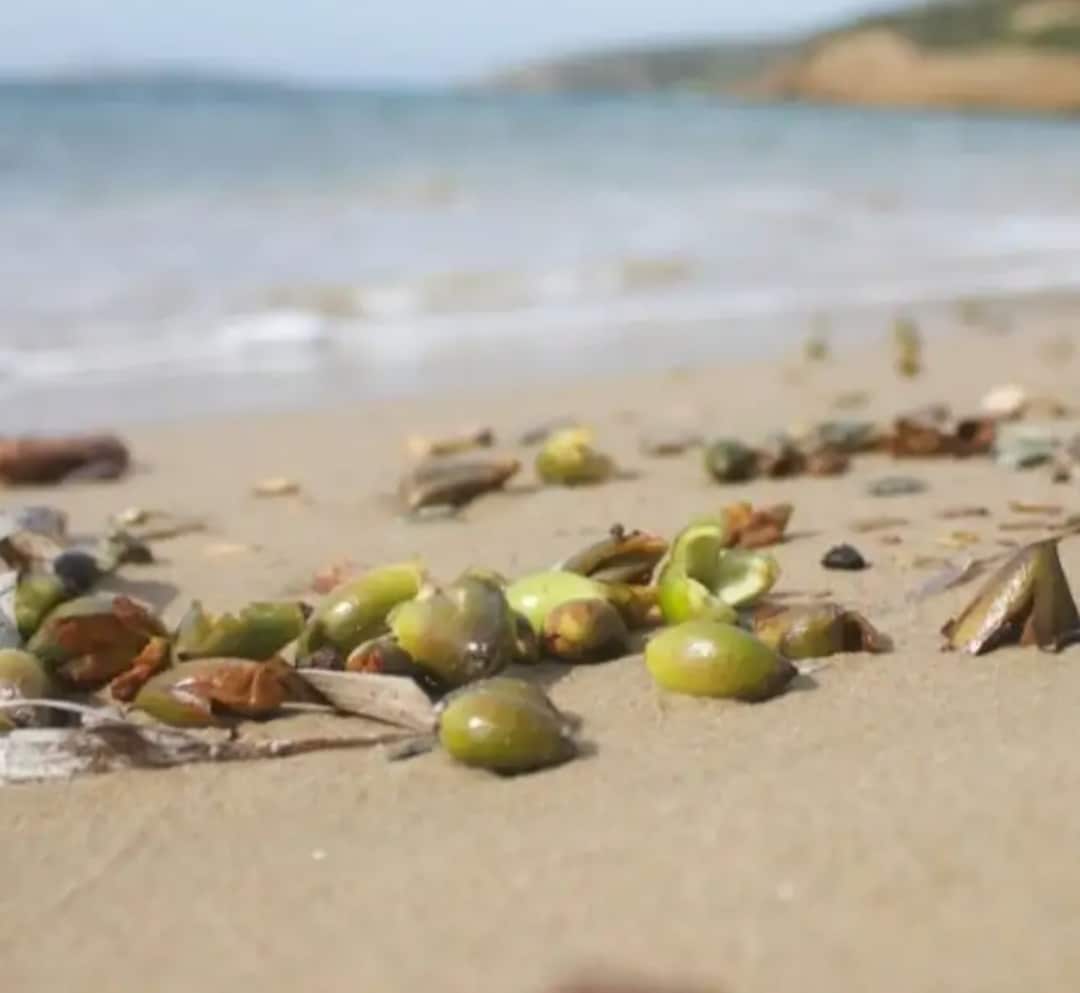

In what researchers describe as a very rare phenomenon, large numbers of fruits and seeds from Posidonia oceanica, the higher plants that are vital for the health of the seas, have been washing ashore across Greece, Cyprus and other parts of the Mediterranean, signaling that this important and endangered seagrass has been in full “bloom.”
According to Archipelagos Institute of Marine Conservation, the phenomenon only occurs every 5-10 years and has not been recorded in the Aegean Sea since the autumn of 2012, when Posidonia oceanica flowered and then developed seeds in the spring of 2013. It is rare for this unique seagrass to bear fruit, which depends on a number of favorable environmental conditions.
Unlike algae, this higher plant’s flowers bear fruit that contain its seeds. The fruit is free-floating and in Italy is known as “the olive of the sea.” Large meadows of this seagrass, also commonly known as Neptune grass, provide highly productive habitats and act as an important indicator of healthy seas.
More importantly, Posidonia meadows are vital in tackling climate change because they can limit, and even reverse, the effects of the crisis, since they can absorb up to 35 times more carbon than tropical forests.
Their presence in the Mediterranean, according to Archipelagos, has already decreased by 34 percent, primarily due to human activities such as unregulated anchoring, destructive fishing practices and intensive aquaculture.
The Archipelagos team has already collected more than 12,000 fruits and seeds, which will be prepared for experimental planting in the coming months. Given the difficulty of such an endeavor, there have been very few similar attempts to plant Posidonia oceanica worldwide.
Hidden below the surface of the sea are the so-called “blue forests” or posidonia seagrass “meadows” that abound on the seabed, creating one of the most valuable habitats in the Mediterranean.
“They are virtually everywhere but they are not seaweed. They are ordinary plants. Marine, flowering plants, just like those we have on the shore. Essentially, they have migrated back to the sea from the shore,” WWF biologist Vaggelis Paravas told the Athens-Macedonian News Agency (AMNA).
As he explained, the meadows of posidonia seagrass constitute a “small miracle” that is not seen in any other place in the world, providing valuable “environmental services” to both humanity and the sea creatures that find refuge there.
“Posidonia is a type of plant that only exists in the Mediterranean. We do not find it in any other place in the world. It is very common but also very important for marine ecosystems,” Paravas said.
Not only do these plants protect beaches from erosion, he noted, serving as fertilizer for plants that contain the sand, but also serve as “sinks of blue carbon” that remove carbon dioxide from the atmosphere.
“Posidonia is found in very shallow waters, up to 45 meters deep, precisely because it is a plant that needs sunlight to photosynthesize,” he said, while it is also very sensitive to the cleanliness of the water, pollution and cloudiness.
He noted that every square meter of healthy seagrass meadow generates up to 20 liters of oxygen a day, while the “blue forests” store roughly 10 percent of the carbon absorbed by the oceans every year.
“Luckily, in our country, we do not have significant pollution in most areas, only in enclosed bays and ports. Therefore, whenever we see long leaves of posidonia we have every reason to swim without fear because the sea is clean and inviting, not just for swimmers but for hundreds of fish and sea creatures,” he added.
